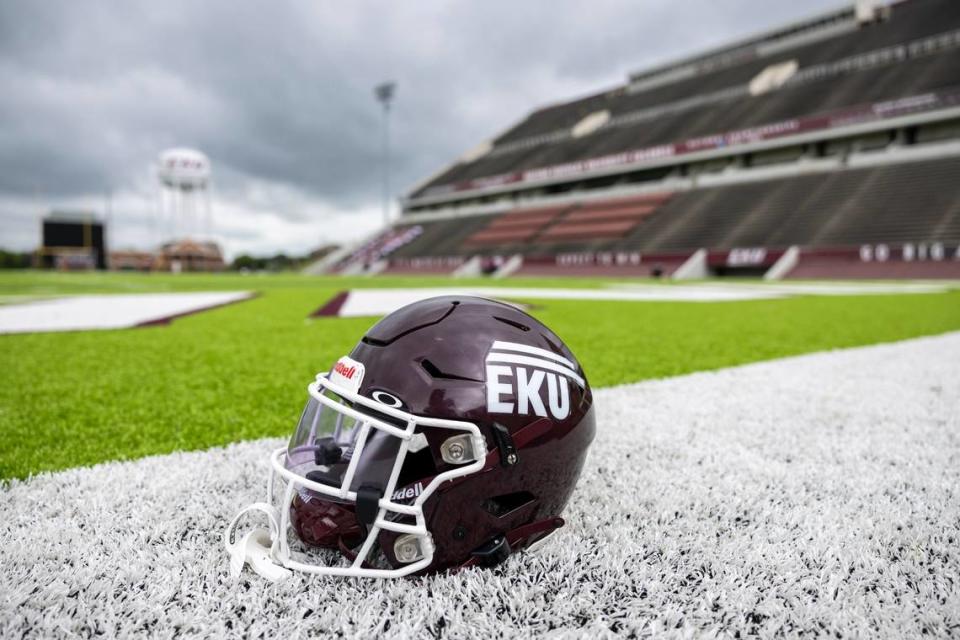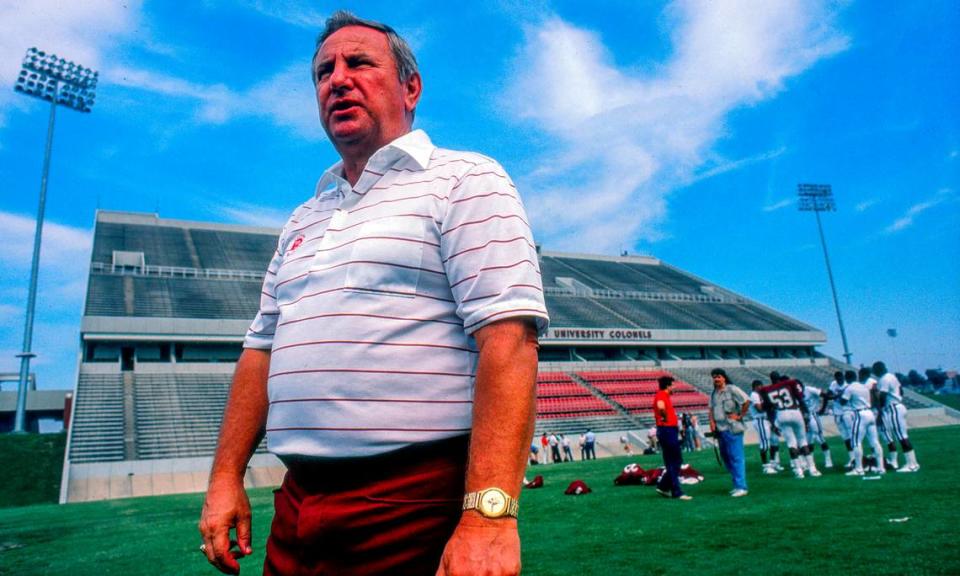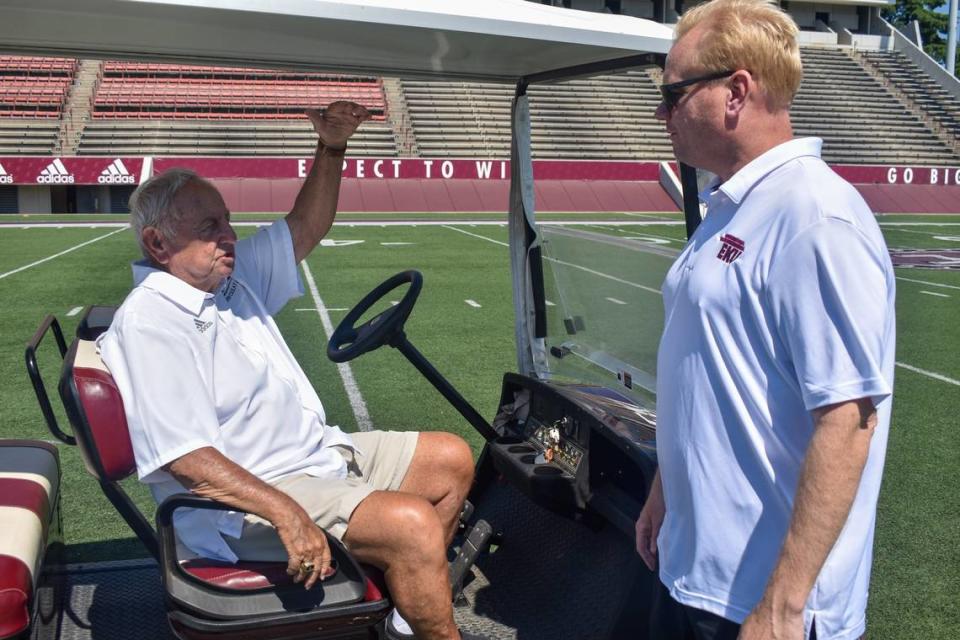‘We believed in him.’ Roy Kidd, EKU’s iconic college football coaching legend, dies at 91.
- Oops!Something went wrong.Please try again later.
- Oops!Something went wrong.Please try again later.
- Oops!Something went wrong.Please try again later.
Roy Kidd, the iconic football coach who led Eastern Kentucky University to two national championships and 314 victories in almost four decades (1964-2002) as Colonels head man, has died.
Kidd died on Tuesday morning, EKU announced. Born on Dec. 4, 1931, Kidd was 91 years old.
Though working with fewer scholarships and financial resources than the major-college football programs at Kentucky and Louisville, Kidd built EKU into the commonwealth’s premier team during his head coaching heyday in the early 1980s.
From 1979-82, Kidd directed Eastern Kentucky to four straight national championship games in what was then called NCAA Division I-AA (now known as the Football Championship Subdivision or FCS).
Kidd’s Colonels won the I-AA national title in 1979 and then produced an undefeated national championship in 1982.
“From day one of me stepping on that campus, he’s always been like a father figure to me,” Elroy Harris, the mid-1980s EKU star running back, said of Kidd.
As a coach, Kidd was demanding but fair, said Tuck Woolum, quarterback of EKU’s 1982 national title team.
“He was very detail-oriented and you had to do it right,” Woolum said. “He wanted to win. You didn’t put out and do what it took to win, you weren’t going to play.”
Eastern Kentucky teams coached by Kidd (314-124-8) won 16 Ohio Valley Conference championships and reached the postseason playoffs 17 times.
“What Coach Kidd was so good at, we believed in him,” said Steve Bird, the star wide receiver on Kidd’s 1982 national championship team. “When he told us something, we knew it was going to happen.”
The twist in Kidd’s near-lifetime association with EKU is that he might never have been affiliated with the school if not for a decision made by Paul “Bear” Bryant that kept the Corbin native from attending the University of Kentucky.
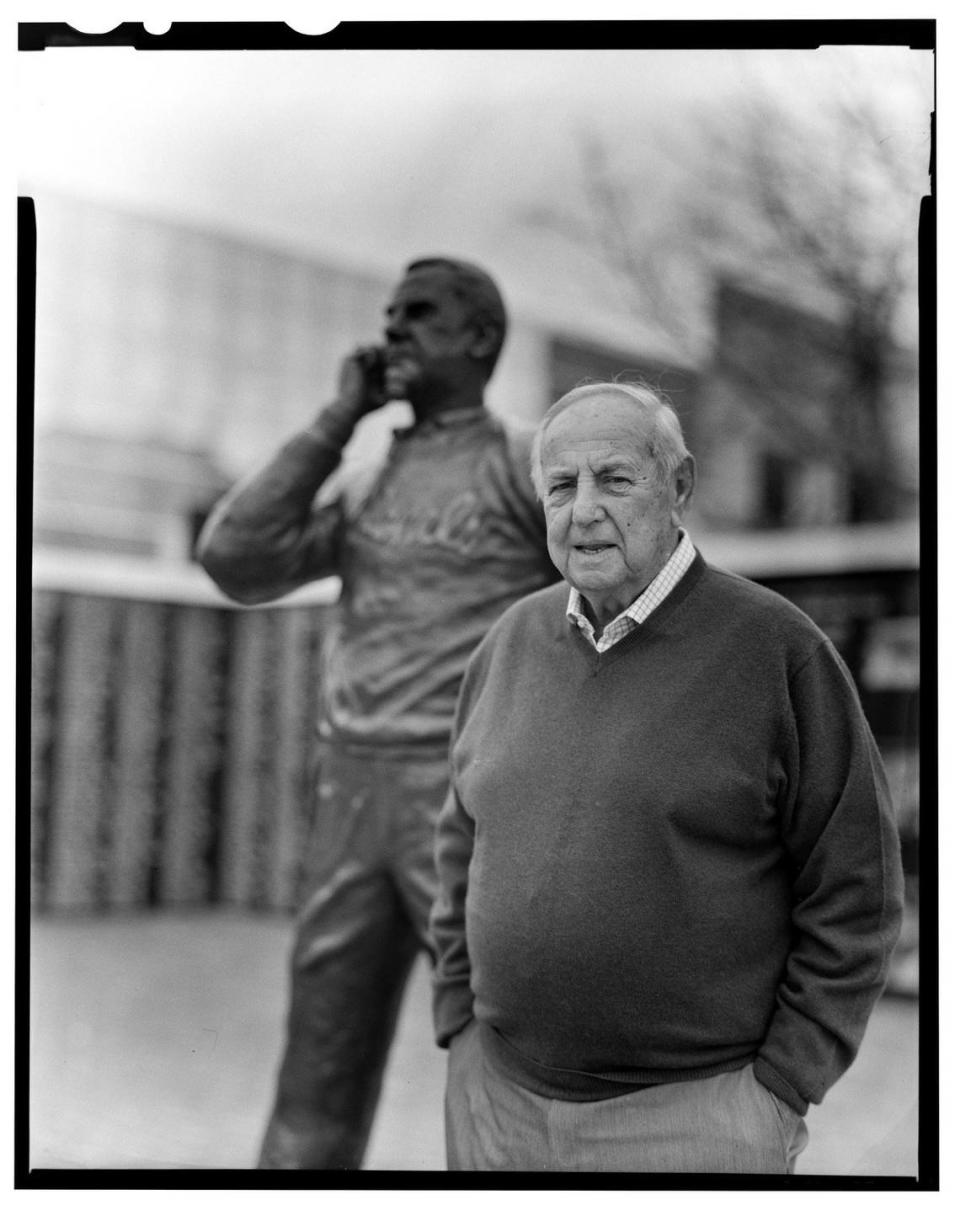
EKU Football mourns the loss of iconic head coach Roy Kidd.
It would be impossible to express everything Coach Kidd has meant to Eastern Kentucky University. He embodied the passion, purpose, and pride that our program strives for every day. Thank you, Coach Kidd! pic.twitter.com/mhm4VXYRpQ— EKU Football (@EKUFootball) September 12, 2023
The path to EKU
Growing up in Corbin in the years after World War II, Kidd excelled in multiple sports. College athletics recruiters took notice.
Like many in Eastern Kentucky, Kidd had grown up a Kentucky Wildcats fan. So it was a thrill when the UK football coach at the time, Bryant, offered him a chance to play for the Cats.
“But I didn’t go,” Kidd recalled in 2019. “I wanted to play baseball, too. But (Bryant) said, ‘No, we practice (football) all spring.’ So I went to Eastern, because they said I could play baseball, too.”
A high school running back, Kidd was moved to quarterback at EKU.
He rewrote most of the Colonels’ passing records. In 1953, he was chosen All-Ohio Valley Conference and a “Little All-American.”
EKU kept its word and allowed its starting quarterback to play baseball, too.
As the Colonels’ center fielder, Kidd hit over .300 in each of his four seasons at Eastern.
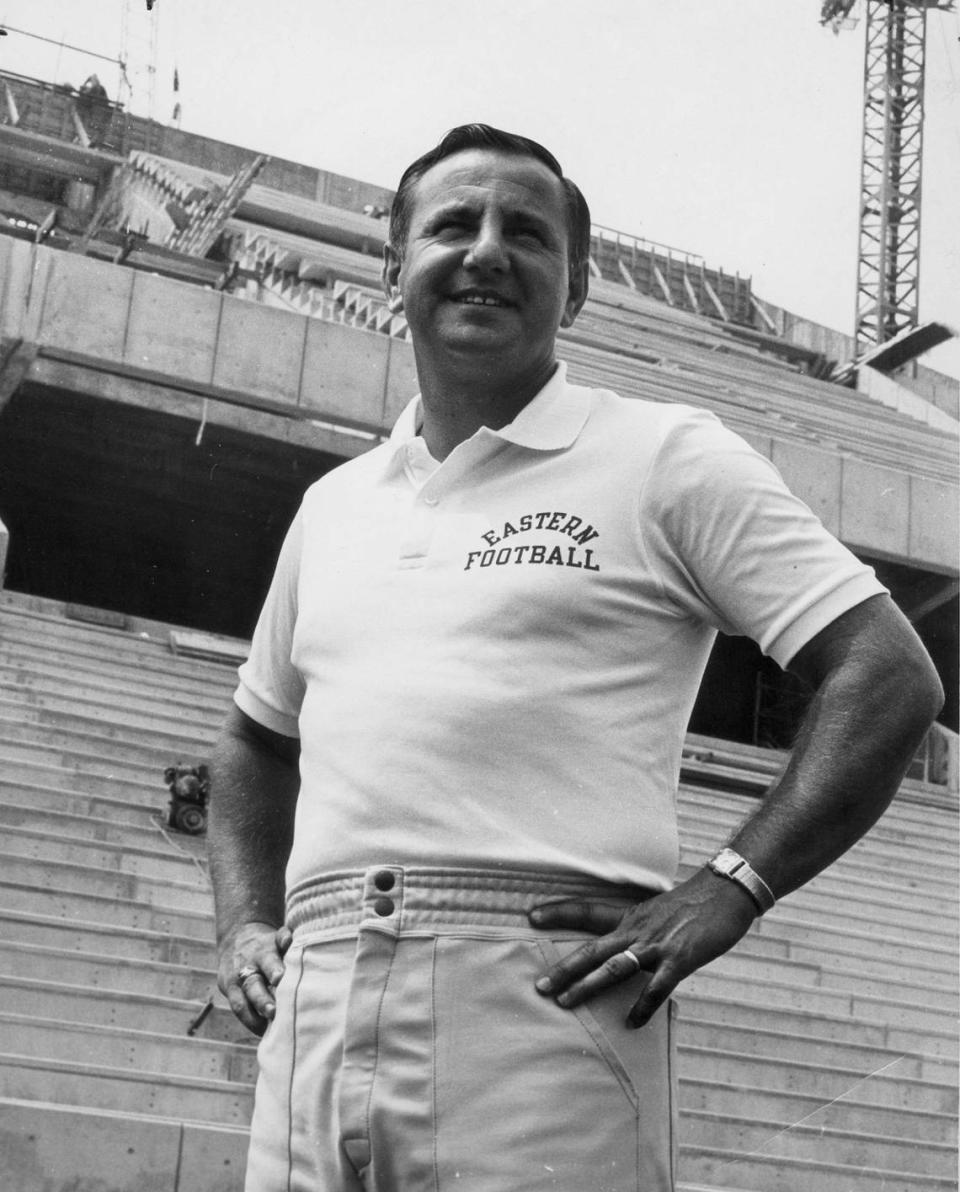
Becoming Eastern head coach
The 1963 football season was not going well for EKU. The Colonels were suffering through a 2-8 slog under Glenn Presnell.
Kidd was in his first season as an Eastern assistant coach.
He had cut his teeth in coaching at Richmond’s Madison High School. In six seasons as the Royal Purples head coach, Kidd went 54-10-1, including a 27-game win streak.
At Richmond Madison, Kidd gained more than the confidence he could succeed as a head coach.
Once, during summer preseason practices, the coach kept noticing the young woman who had been hired to train the high school band’s majorettes.
One thing led to another and, on Jan. 21, 1961, Kidd and the majorette coach, Sue Purcell, walked down the aisle to exchange wedding vows.
Career-wise, the dream for Kidd was college coaching.
In 1962, Morehead State, one of EKU’s fiercest rivals, gave Kidd his big break by hiring him as an assistant. Morehead, with Kidd on its sideline, went on to beat Eastern that season.
People in Richmond took note of that. So the following offseason, Kidd was lured back to his alma mater as backfield coach.
At the end of EKU’s lost 1963 football season, Kidd was teaching a health class when word came that Eastern Kentucky president Robert Martin wished to see him.
Kidd had been expecting the summons. He called his wife and asked, “Are you sure you want to do this?”
Assured by Sue that she was all-in, Kidd went to give the EKU president his answer: Yes, the young couple were willing to move on campus and become dormitory advisors.
On an assistant coach’s salary (Kidd was making $6,800 a year), cutting expenses by living in campus housing was the only way Roy and Sue saw to ever be able to save enough money to buy a house.
But rather than a dorm advisor’s role, Martin asked Kidd if he wanted to be the new EKU head football coach.
Kidd drove home and told Sue she was looking at the new Colonels head man.
What’s that pay, Sue asked.
Roy had no idea. He had not asked.
It was $8,100 a year.
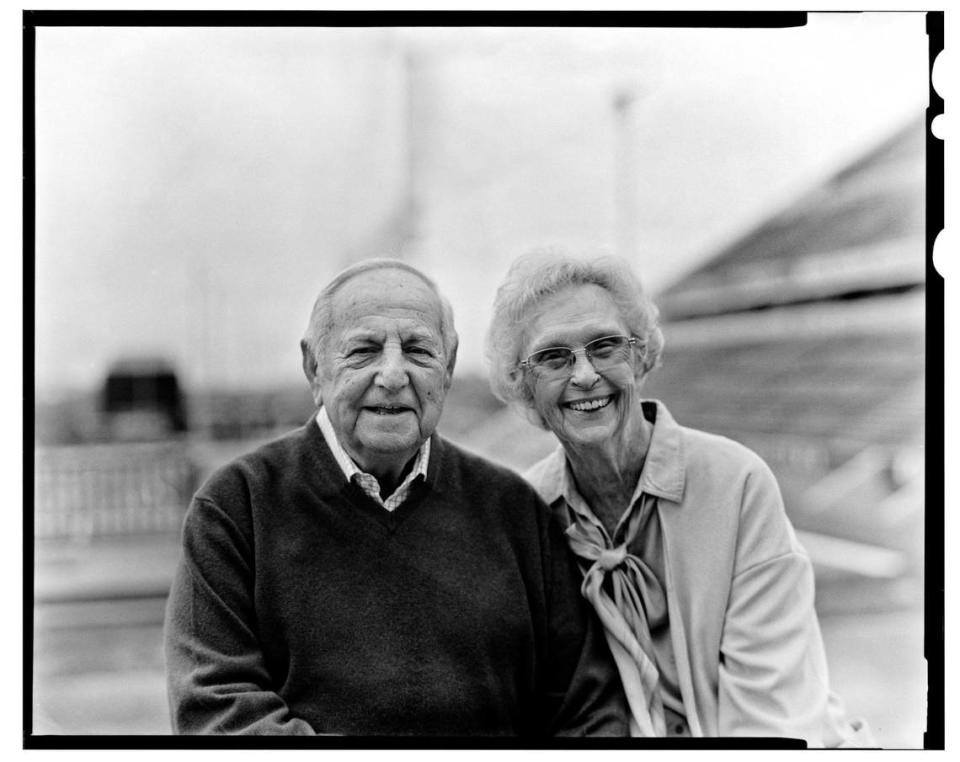
Spoiling WKU’s ‘house warming’
It took Kidd until his third season as EKU head man, 1966, to produce his first winning record (7-3).
Kidd’s fourth year saw the coach field his first great team. The 1967 Colonels went 8-1-2 and won the Grantland Rice Bowl.
Yet it was Kidd’s fifth team, in 1968, that produced the victory that old-school Eastern fans still consider the Colonels’ greatest win.
When Eastern traveled to Bowling Green to face archrival Western Kentucky in 1968, Coach Jimmy Feix’s Hilltoppers were unbeaten and unscored upon. With EKU in town, WKU would be dedicating the new L.T. Smith Stadium.
Throngs of Eastern students traveled west for the game, only to find out they could not get in. Many wound up standing outside the stadium end zones looking in through wrought-iron gates.
What they watched was Jim Guice quarterback Eastern to a 16-7 upset that spoiled WKU’s “house warming.”
“In all my years here, that’s my favorite memory,” said Karl Park, the longtime EKU sports publicist.
That outcome helped escalate the Eastern-Western rivalry to full boil. In the 1970s, WKU-EKU was our state’s galvanizing football rivalry.
Kidd and Feix (who died in 2014) were maniacal about beating each other.
“They were really bitter rivals, I mean, they were intense about beating each other,” Park said. “But they had kind of an admiration society, too. I know at (Kidd’s) retirement dinner, Jimmy came up and spoke. After their coaching days, they would talk and were pretty close friends.”
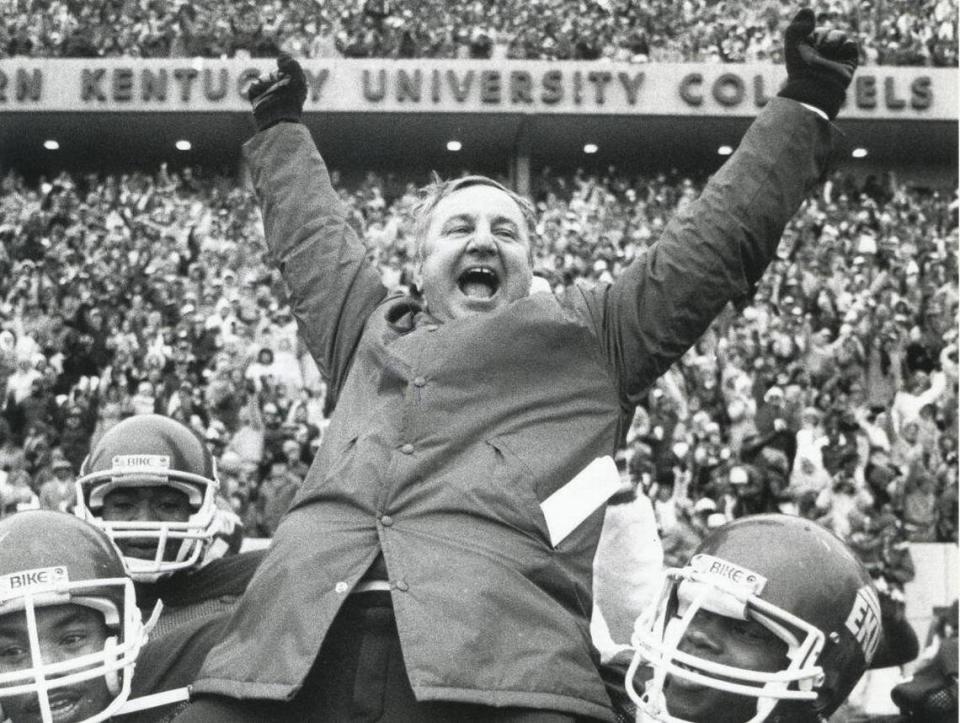
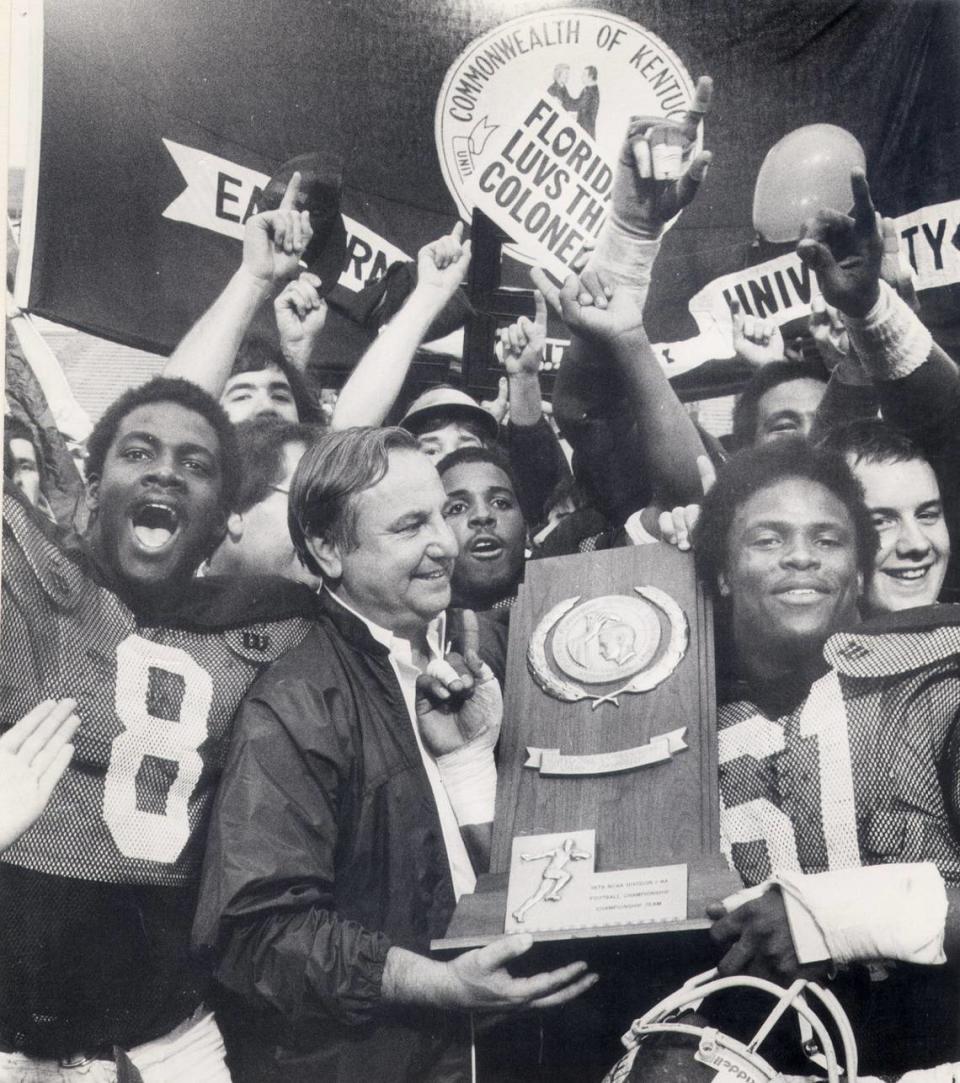
The glory years
What helped Kidd take Eastern to four straight national title games between 1979-82 was a competitive advantage.
Kidd was an early adapter in figuring out that the state of Florida produced more talented high school players than the Sunshine State’s universities could accommodate.
The origins of Eastern’s “Florida recruiting pipeline” trace to a Kidd assistant, Bill Shannon, who would go to the Sunshine State to fish during the mid-semester break each school year. On those trips, Shannon began to develop ties with Florida high school coaches, Kidd recalled in 2019.
“I used to go and recruit Florida myself,” Kidd said. “I took central Florida, Orlando. One year, I took two assistants with me. Each of us would try to get to eight schools (a day). Each coach would get film (on prospects from each school), then we would sit there and throw it up on the wall (at the motel) and evaluate ’em.”
The players Kidd wooed from Florida, many of them Black, changed Eastern football.
“(Kidd) would definitely come to some real bad spots to get us. I’m just being honest,” said Harris, one of the Black players who came north to EKU. “But when I was (at Eastern), there were 20-some players from Florida, from my area, who were there, too. It was more like family than being a team.”
In 1979, led by quarterback Bill Hughes, Kidd and Eastern won their first national championship, defeating Lehigh 30-7 in the I-AA championship game.
The following two years yielded losses to Boise State (1980) and Idaho State (1981) in the finals of the I-AA playoffs.
Those set the stage for Kidd and Eastern to produce their greatest season.
Roy Kidd-coached teams were known for powerful rushing attacks, rock-ribbed defenses and kick-blocking special teams. Of Eastern’s top 10 all-time leading rushers (through the 2020 season), nine played for Kidd.
Yet the 1982 national title team had an extra dimension.
The home-grown passing connection of Pineville’s Woolum throwing to Corbin native Bird helped Eastern roll through an undefeated season. It ended with EKU edging Delaware 17-14 for the national title to finish 13-0.
“Steve and I, we grew up Kentucky fans,” Woolum said. “Well, Kentucky didn’t recruit either of us. Coach Kidd believed in us, so we both signed with Eastern — which we wouldn’t trade for the world.”
Greg Stotelmyer, the longtime EKU radio play-by-play announcer, started his ongoing run calling Eastern games with the 1979 football national championship season.
“Four years, going to the national championship game every year, that was awesome,” Stotelmyer said. “The run (Kidd) had was amazing.”
After the second national championship in 1982, Kidd had many more good teams at Eastern but never again advanced beyond the playoff semifinals.
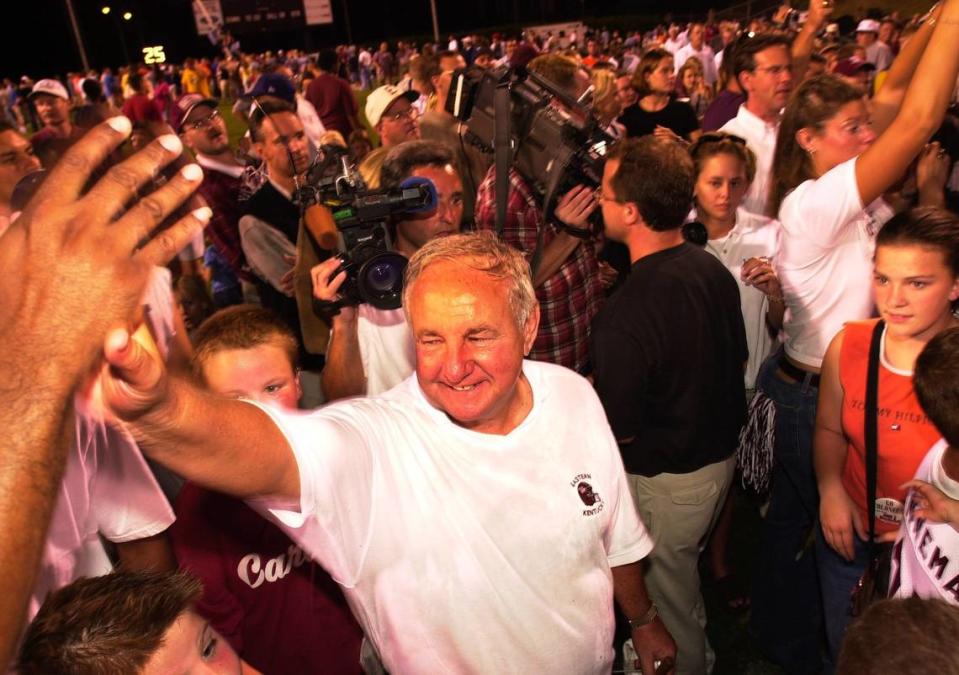
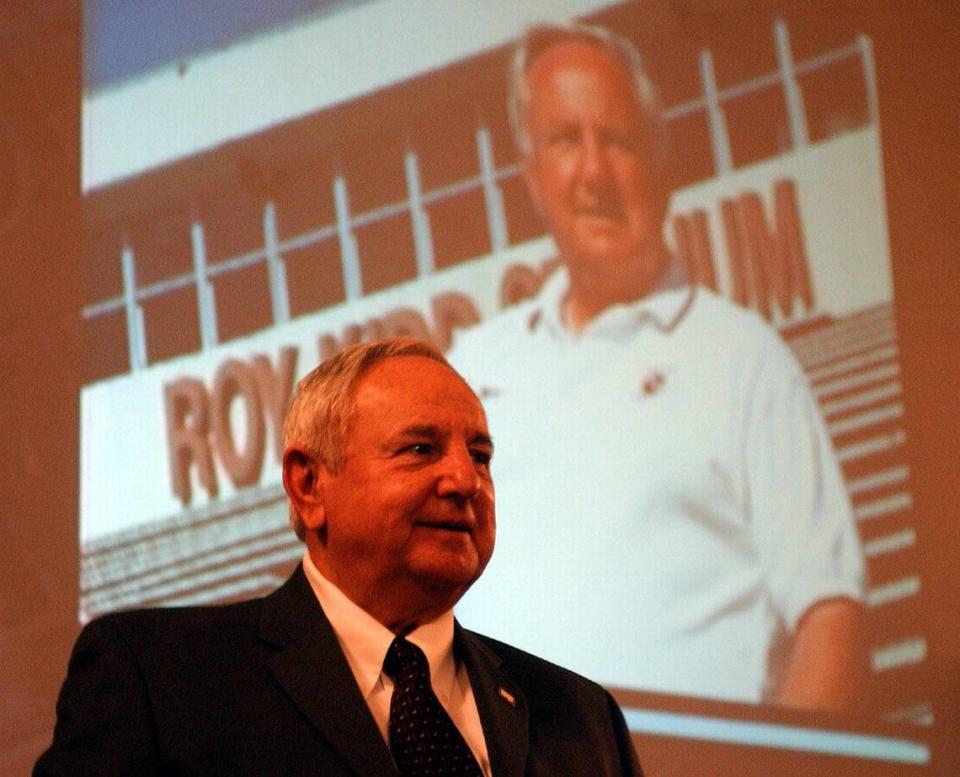
The legacy
Kidd is survived by his wife, Susan “Sue” Purcell Kidd; their three children, Marc Kidd (Amy Luyster) of Plano, Texas; Kathy Kuhl (Lewis) of Miami, Florida; and Keith Kidd (Laura Estepp), of Richmond; six grandchildren; and four great-grandchildren.
Visitation for Kidd will be Sunday, Sept. 17, from 4 to 7 p.m. at the EKU Center for the Arts. The funeral will be Monday, Sept. 18, at 11 a.m. at the same venue with Bill Fort officiating. A private burial will follow in the Richmond Cemetery.
At the height of his coaching career, Kidd’s Eastern program was so “big” in Kentucky that the EKU coach was voted by the state’s sports media as the winner of the first two Lexington Herald-Leader Kentucky Sports Figure of the Year awards in 1981 and ‘82.
When Kidd retired from coaching in 2002, his 314 victories were then the sixth-most in NCAA Division I history.
Kidd was inducted into the College Football Hall of Fame in 2003.
In 2019, a panel convened by ESPN.com ranked Kidd as the 60th-greatest coach in college football history at any level.
Across the years, Kidd would sometimes acknowledge wondering how he would have fared had he gotten the chance to coach on a bigger stage.
At various times in his Eastern tenure, Kidd interviewed for head coaching jobs with schools such as Army (West Point), Ball State and Marshall.
His ambivalence at the thought of leaving EKU meant he never really went all-out after those jobs, Kidd said.
The one job he did give it his all to get would have provided him a chance to coach at the school he rooted for as a child.
After Fran Curci was fired by UK in 1981, Kidd got what he considered a “token interview” from Kentucky. However, after Jerry Claiborne retired in 1989, Kidd felt like he got a thorough vetting from then-UK athletics director C.M. Newton and Kentucky’s search committee.
“That was the only time I really got prepared and went someplace that I really wanted the job,” Kidd said. “I outlined everything: assistant coaches I needed, type of player I needed, I just did it all. And then I passed it around to the committee.”
Kidd said he was subsequently told by a search committee member that Kentucky had offered the job to Bill Curry, then the Alabama coach. However, there was some feeling that Curry, a Georgia Tech alumnus, would say no because he hoped to return to Atlanta as the Yellow Jackets’ athletics director.
If Curry turned UK down, Kidd said he was told he would probably get the offer to coach Kentucky.
“That made me kind of get a little excited,” Kidd said.
Curry, of course, said yes to Kentucky.
Kidd spent the entirety of his college head coaching career at his alma mater.
The benefits of “never leaving home” played out on multiple levels.
Since Sept. 8, 1990, the site of EKU home football games has been known as Roy Kidd Stadium.
From 1991 through 1994, Kidd served Eastern as both its football coach and athletics director.
Beginning in September 2017, a larger than life statue of Kidd, mostly funded by his former players, has stood in the north end zone of the stadium.
“Coach Kidd is (EKU’s) namesake,” said Park, the longtime Eastern athletics publicist. “When people think about Eastern Kentucky University, I definitely think it is (Kidd’s) name that comes to mind.”
